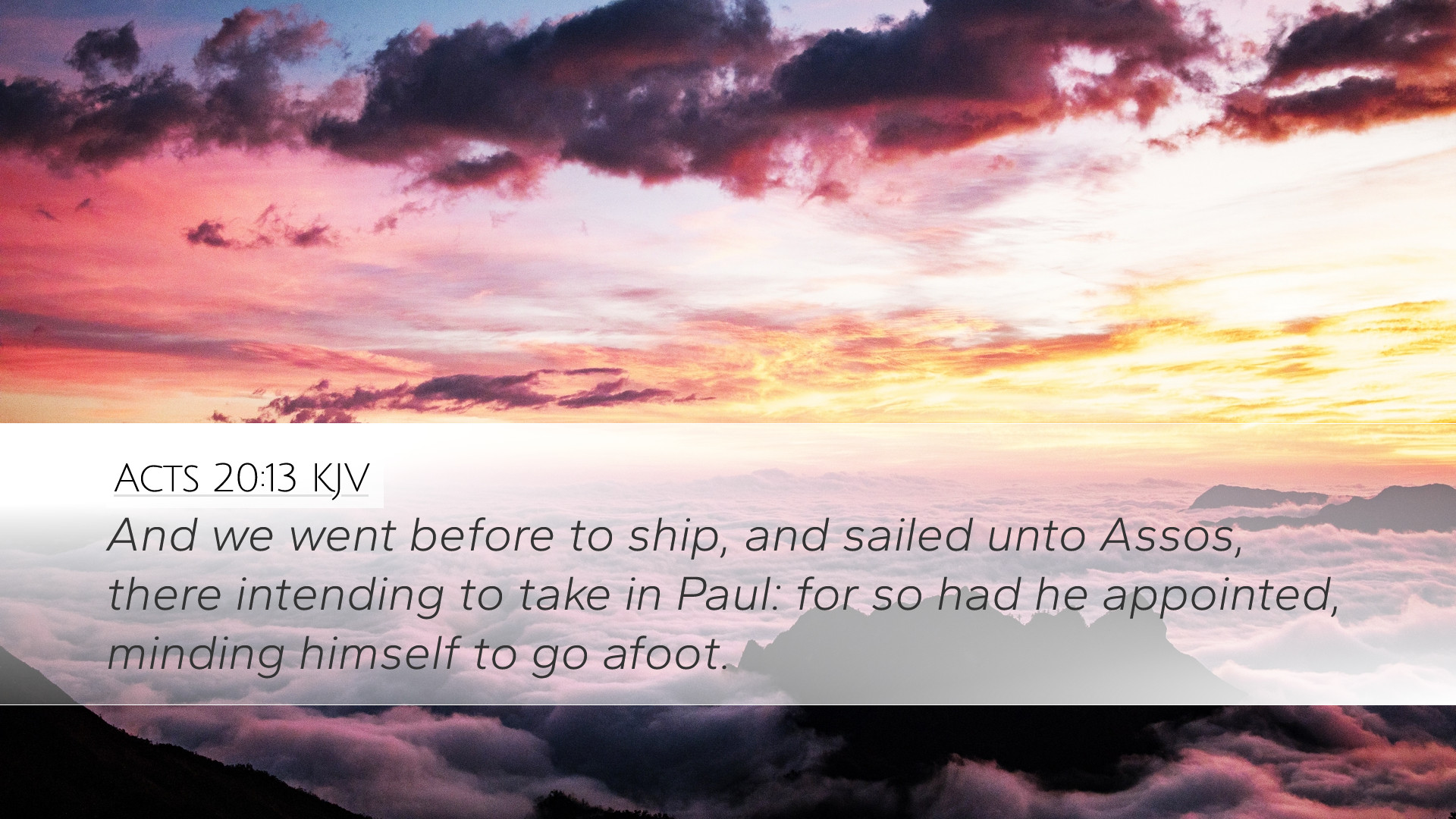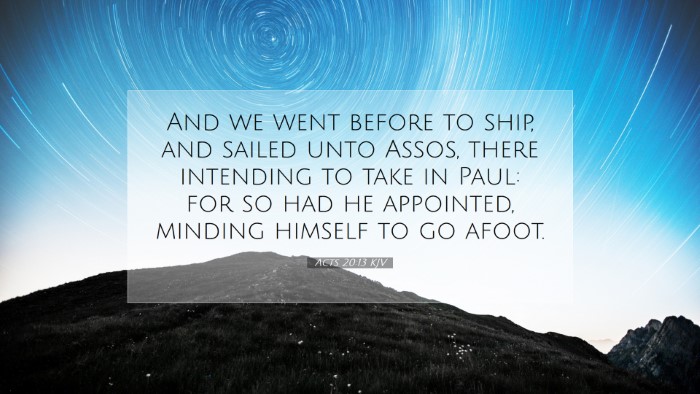Commentary on Acts 20:13
Acts 20:13 provides a fascinating insight into the journey of the Apostle Paul and his companions as they travel through Asia Minor. This passage is packed with implications for pastoral work, theological reflection, and understanding the early church. In this commentary, we will synthesize insights from renowned public domain commentators like Matthew Henry, Albert Barnes, and Adam Clarke.
Text of Acts 20:13
“And we went before to ship, and sailed unto Assos; there intending to take in Paul: for so had he appointed, minding himself to go afoot.”
Historical Context
The context of this verse falls within a critical period in the Book of Acts, where the missionary travels of Paul are at their height. The city of Assos was a port on the Aegean Sea, linking the land with maritime routes. The choice of Paul to travel by foot instead of joining his companions by ship reflects both his personal commitment and perhaps a strategic decision based on circumstances.
Insights from Commentators
Matthew Henry
Henry emphasizes the leadership of Paul, noting that he had a clear agenda and purpose as he directed his companions. He reflects on the idea that Paul’s intention to journey on foot suggests a desire for solitude, prayer, or perhaps an opportunity to meditate on his mission. Henry points out that this shows the balance between fellowship in ministry and the necessity for personal communion with God.
Albert Barnes
Barnes draws attention to the geographical and nautical aspects of this passage. He explains that the journey by ship was the typical mode of travel, but Paul’s decision to walk indicates a deliberate choice that might be linked to his health, preference for time alone, or specific revelations he was contemplating. Barnes also highlights that this passage illustrates the coordination necessary among ministry partners and how God’s work often involves both companionship and individual responsibilities.
Adam Clarke
Clarke tackles the symbolism present in Paul’s choice of transport. He perceives it as indicative of Paul’s lifestyle - one marked by dedication and sacrifice for the sake of the Gospel. Clarke notes that Assos is significant because it represents both a destination and a moment of transition for Paul as he journeyed towards Jerusalem. He also comments on the necessity of being in tune with God’s leading, suggesting that true ministry often involves moments of difficult choices that test one’s commitment to the call of God.
Theological Reflections
In considering the text of Acts 20:13, several theological reflections emerge which are particularly relevant for pastors and theologians:
- Personal Responsibility: Paul’s decision to walk rather than take the ship may suggest the importance of taking personal responsibility in our journeys of faith and ministry. As leaders, we are called to make deliberate choices that align with our personal convictions and God’s purpose.
- Solitude and Reflection: The passage also emphasizes the value of solitude. In a world filled with distractions, moments of solitary reflection can deepen our spiritual lives and enhance our effectiveness in ministry.
- Coordination in Ministry: Paul’s relationship with his companions highlights the significance of teamwork in ministry. The necessity of planning and coordination demonstrates the practical side of spiritual work. Even as Paul made a personal choice, the journey involved collaborative efforts.
Pastoral Applications
For pastors and church leaders today, Acts 20:13 serves as a reminder to be attentive to the Holy Spirit's leading. Here are some practical applications:
- Encourage Reflection: Create space for reflection and solitude in your church programs to allow leaders and members to engage with God personally.
- Foster Teamwork: Develop a culture of teamwork in ministry where planning and collaboration are prioritized, just as Paul's companions worked in unison with him.
- Model Decision-Making: Be transparent in decision-making processes, showing how spiritual discernment is needed when addressing challenges in ministry.
Conclusion
Acts 20:13 allows us to glimpse into the life of an early church leader committed to the mission of Christ, demonstrating the essentials of personal commitment and community responsibility. The commentary provided by Matthew Henry, Albert Barnes, and Adam Clarke offers profound insights that remain relevant for contemporary ministry. As we reflect on Paul’s journey, may we be inspired to pursue our paths with determination and faithfulness, balancing the call to communal ministry with the need for personal devotion.


